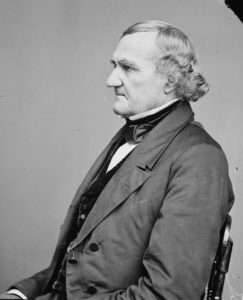The Volokh Conspiracy
Mostly law professors | Sometimes contrarian | Often libertarian | Always independent
Today in Supreme Court History: May 30, 1865
Editor's Note: We invite comments and request that they be civil and on-topic. We do not moderate or assume any responsibility for comments, which are owned by the readers who post them. Comments do not represent the views of Reason.com or Reason Foundation. We reserve the right to delete any comment for any reason at any time. Comments may only be edited within 5 minutes of posting. Report abuses.
Please to post comments



BNSF Ry. Co. v. Tyrrell, 581 U.S. 402 (decided May 30, 2017): railroad could be sued in state where it was neither based nor incorporated nor where accident happened (IOW, under general “doing business” jurisdiction as allowed by state statute) despite Daimler AG v. Bauman, 2014, which held that “doing business” jurisdiction did not comport with due process, because 45 U.S.C. §56 allows suit against railroads in any “doing business” state which is only a venue and not a jurisdictional phrase (this is lame; I think the Court was trying to put a diaper on Daimler)
County of Los Angeles v. Mendez, 581 U.S. 420 (decided May 30, 2017): reasonable force as a result of intentionally/recklessly provoking a violent confrontation (in violation of Fourth Amendment) is not “unreasonable use of force” so as to void qualified immunity (police improperly broke in without warrant and woke up defendant, who thinking it was his girlfriend, moved his rat-hunting BB gun off the bed so that he could get up; police shot him multiple times)
Esquivel-Quintana v. Sessions, 581 U.S. 385 (decided May 30, 2017): “sexual abuse of minor” (a reason for deportation under the Immigration Act) presumes general federal law definition of minor (under age 16) rather than law of State of conviction (18) and therefore deportation order based on guilty plea as to 17-year-old girl overturned
Hildwin v. Florida, 490 U.S. 638 (decided May 30, 1989): Sixth Amendment (trial by jury) does not require that, after conviction, findings of fact authorizing death penalty be made by jury; judge can decide sentence after hearing jury’s mere recommendations and is not bound by them
Deepsouth Packing Co. v. Laitram Corp., 406 U.S. 518 (decided May 30, 1972): it is not a patent infringement to sell parts of a patented invention (a shrimp deveining machine) to overseas buyers for assembly (abrogated by statute in 1984) (note White’s flowery language which shows that as a writer he was a good football player)
Socialist Labor Party v. Gilligan, 406 U.S. 583 (decided May 30, 1972): no “case or controversy” as to contention by political party that Ohio’s requiring loyalty oath for placement on ballot violated Equal Protection because of intervening change in election law, failure to allege injury or actual exclusion from ballot, and fact that party had repeatedly signed the oath in the past
In re Primus, 436 U.S. 412 (decided May 30, 1978): ACLU attorney who had given lecture to women who had been involuntarily sterilized and then sent letter stating that the ACLU would offer free legal assistance was protected by First and Fourteenth Amendment freedom of expression; disciplinary reprimand for “solicitation” vacated
Raleigh v. Illinois Dept. of Revenue, 530 U.S. 15 (decided May 30, 2000): bankruptcy does not change burden of proof, and state law provides rule for state law claims (here, Illinois law held that burden of proof as to whether tax is owed by debtor is on the debtor/bankruptcy trustee)
Bernal v. Fainter, 467 U.S. 216 (decided May 30, 1984): Texas requirement that a notary be a United States citizen violated Equal Protection under strict scrutiny (no “compelling state interest” -- plaintiff was a resident alien)
Burns v. Reed, 500 U.S. 478 (decided May 30, 1991): prosecutor who obtained search warrant after advising police officers to question multiple-personality defendant under hypnosis (one of her other personalities was suspected of shooting her children) enjoyed prosecutorial immunity in 42 U.S.C. §1983 suit as to conduct at probable cause hearing but not as to advice to police (one of the personalities had been the one to make the initial call after the shooting) (it’s unclear which of the personalities brought the §1983 suit -- how many “plaintiffs” had to be deposed?)
Is Hildwin still good law after Ring v. Arizona?
I don't think so. Ring, 2002, mentioned Hildwin in passing, but it specifically overruled Walton v. Arizona, 1990, which relied on Hildwin and other cases.
No. See Hurst v. Florida, 577 U.S. 92, 102 (2016).
And I always thought White's sport was baseball...
https://www.behindthesteelcurtain.com/2021/2/6/22235231/byron-white-the-man-who-did-it-all-pittsburgh-pirates-steelers-whizzer-1938-us-supreme-court
They were still talking about Byron White in the Steelers' front office during the 1970s.
On March 3, 1837, his last day in office, President Andrew Jackson nominated John Catron to one of two new Supreme Court seats created by the Eighth and Ninth Circuits Act, which expanded the Court from seven to nine members. Catron would be confirmed by the Senate five days later. (Jackson, that same day, also nominated William Smith to the other new seat created by the Act. Smith was confirmed by the Senate, but declined to serve. Jackson's successor, President Martin Van Buren, would appoint John McKinley to the seat.)
After Justice Catron died in 1865, President Andrew Johnson nominated Henry Stanberry to succeed him, but rather than consider the nomination, Congress passed the Judicial Circuits Act of 1866, which abolished Catron's former seat as well as the next two to become vacant. Consequently, John Catron is the only justice to have occupied Associate Justice Seat 7, giving him the distinction of being the only Supreme Court justice to have had neither a predecessor nor a successor to his position.
You're welcome!
You know politicians. I'm surprised someone didn't argue that the fame alone from helping had a monetary value...
Maybe that stuff awaited a future adventurous pol trying to tie up political opponents, claiming every last thing a body can do has monetary value attached.